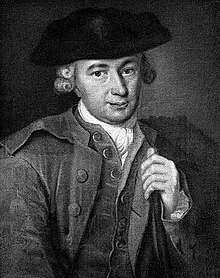This article includes a list of general references, but it lacks sufficient corresponding inline citations. (November 2013) |
Johann Georg Hamann | |
|---|---|
 | |
| Born | 27 August 1730 |
| Died | 21 June 1788 (aged 57) |
| Alma mater | University of Königsberg (1746–1751/52; no degree) |
| Era | 18th-century philosophy |
| Region | Western philosophy |
| School | Post-Kantian Counter-Enlightenment Sturm und Drang |
Main interests | |
Notable ideas | "Reason is language" ("Vernunft ist Sprache")[1] |
Johann Georg Hamann (/ˈhɑːmɑːn/; German: [ˈhaːman]; 27 August 1730 – 21 June 1788) was a German Lutheran philosopher from Königsberg known as "the Wizard of the North" who was one of the leading figures of post-Kantian philosophy. His work was used by his student J. G. Herder as the main support of the Sturm und Drang movement, and is associated with the Counter-Enlightenment and Romanticism.[5][6]
He introduced Kant, also from Königsberg, to the works of both Hume – waking him from his "dogmatic slumber" – and Rousseau. Hamann was influenced by Hume, but he used his views to argue for rather than against Christianity.[7]
Goethe and Kierkegaard were among those who considered him to be the finest mind of his time.[8] He was also a key influence on Hegel and Jacobi.[9] Long before the linguistic turn, Hamann believed epistemology should be replaced by the philosophy of language.
- ^ Cite error: The named reference
Briefwas invoked but never defined (see the help page). - ^ O'Flaherty 1979, p. 19.
- ^ Garrett Green, Theology, Hermeneutics, and Imagination: The Crisis of Interpretation at the End of Modernity, Cambridge University Press, 2000, p. 53.
- ^ "Hamann's Influence on Wittgenstein". Nordic Wittgenstein Review. 2018-06-26. Retrieved 2022-04-11.
- ^ Isaiah Berlin, Three Critics of the Enlightenment: Vico, Hamann, Herder, London and Princeton, 2000.
- ^ Berlin, Isaiah (1993). The Magus of the North: J. G. Hamann and the Origins of Modern Irrationalism. New York: Farrar, Straus and Giroux. ISBN 978-0-374-19657-8.
- ^ Griffith-Dickson, Gwen (2017), "Johann Georg Hamann", in Zalta, Edward N. (ed.), The Stanford Encyclopedia of Philosophy (Fall 2017 ed.), Metaphysics Research Lab, Stanford University, retrieved 2020-01-22
- ^ Betz, John (January 2009). "Reading "Sibylline Leaves": J. G. Hamann in the History of Ideas". Journal of the History of Ideas. 70 (1): 94–95. doi:10.1353/jhi.0.0025. JSTOR 40208092.
- ^ "Johann Georg Hamann | German philosopher". Encyclopedia Britannica. Retrieved 2020-01-22.